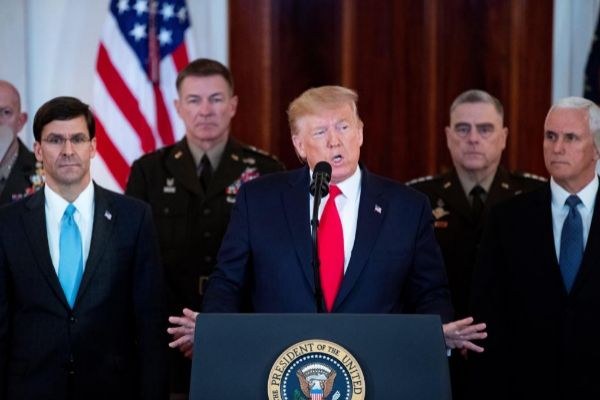Iran's war response to the selective assassination executed last Friday by the US against the regime's number two, Qasem Soleimani , has not brought about a substantial change in the US Administration's strategy regarding the Iranian theocracy. Since his arrival at the White House, Donald Trump opted to abandon the containment and appeasement policy, embodied in the antinuclear pact promoted by his predecessor Barack Obama and backed by the EU, to impose economic sanctions on the Ayatollah regime. Although the Iranian attacks against two US bases in Iraq have not caused any casualties and have only caused "minimal damage," Trump announced new sanctions against Iran, a strategy that has proven quite damaging to a regime that does not hide its intentions. of developing nuclear weapons in the medium term. The US president also called on NATO and countries such as France, the United Kingdom and Russia to abandon the nuclear agreement signed in 2015 and join the effort that the US is leading on the ground with the aim of curbing Iranian expansionism in the region , whose main driver was General Soleimani.
The latter is precisely what the Islamic regime wants to avoid, which yesterday, through the mouth of its supreme leader, Ali Jamenei , demanded the complete withdrawal of the US presence in the area, stating that the "region no longer tolerates the presence of States United". It should not be forgotten that since in 2010 Obama ordered the gradual withdrawal of forces deployed in Iraq, Iran has not ceased to expand its influence in neighboring countries with an aggressive policy imposed through terrorist and subversive acts. It has been his militias that have held the criminal dictator Bashar Asad at the helm of Syria, helping him win the war; and thanks to terrorist groups such as Hezbollah, Hamas and Islamic Jihad, Iran maintains almost absolute control of Lebanon and subjects relentless harassment of Israel.
With Iraq, the strategy is the same, since a large part of the Iraqi armed forces are made up of former Shiite militiamen who act under the orders of the Iranian regime, and several radicalized groups threaten US interests in the country . The US estimates that an important part of its casualties have been caused by this militia, which is also behind the last assault on its embassy in Baghdad. This is the reason why the White House declared the Iranian Revolutionary Guard as a foreign terrorist organization in April and targeted Soleimani, leader of the Quds Force, responsible for hundreds of terrorist attacks in the area. His murder, an example of Trump's irresponsible unilateralism, has opened a scenario of tension with unforeseeable consequences that need to be scaled to avoid the worst.
According to the criteria of The Trust Project
Know more- Iran
- Iraq
- Barack Obama
- Syria
- NATO
- United Kingdom
- Russia
- Lebanon
- Israel
- France
- U.S
- Donald Trump
- international
- Editorial
- Opinion
Café SteinerUSA shoots in the foot
Let's talk about geopolitics 'Desert Fox', 2020
Print US: Trump improves his popularity

